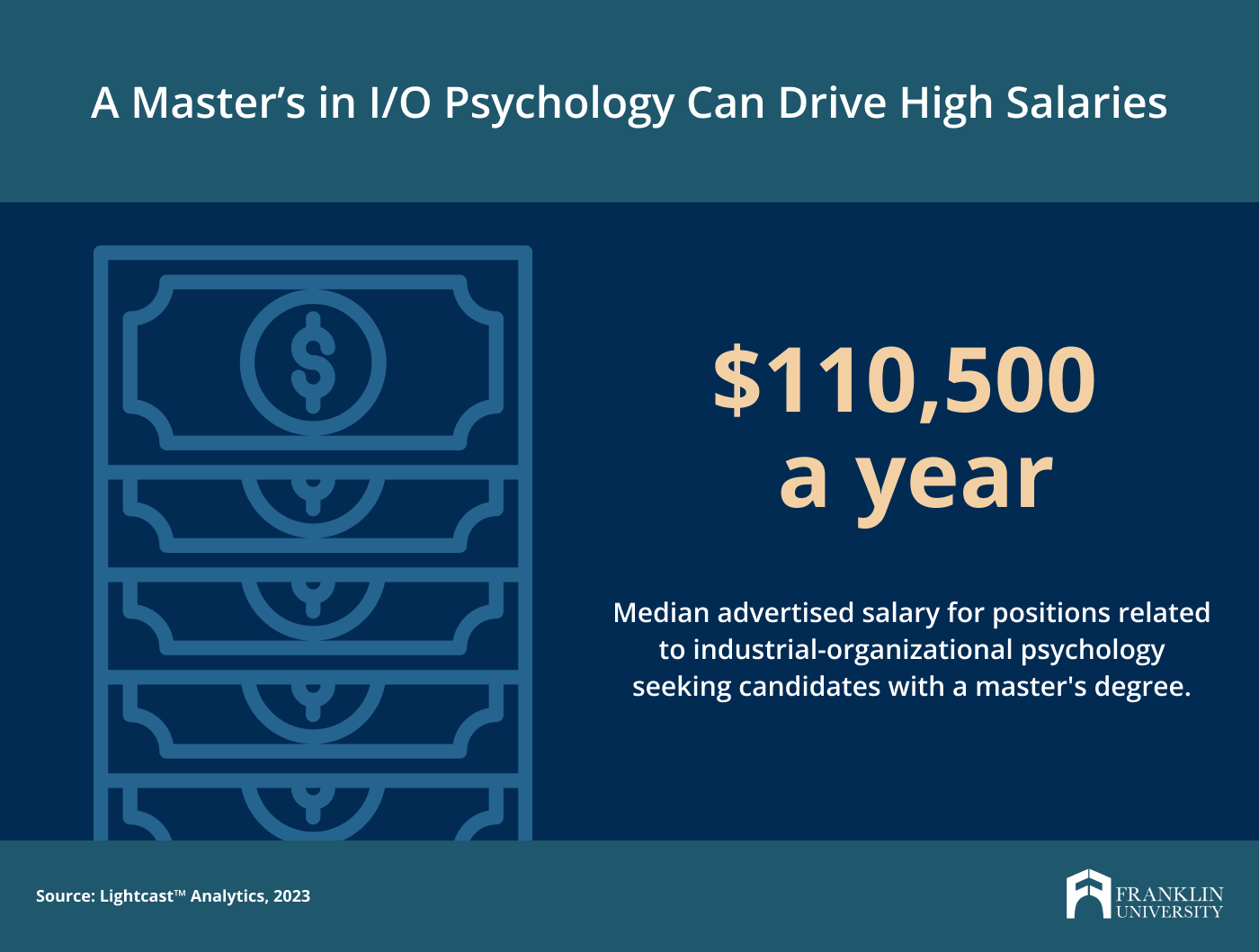Request Information
We're Sorry
There was an unexpected error with the form (your web browser was unable to retrieve some required data from our servers). This kind of error may occur if you have temporarily lost your internet connection. If you're able to verify that your internet connection is stable and the error persists, the Franklin University Help Desk is available to assist you at helpdesk@franklin.edu, 614.947.6682 (local), or 1.866.435.7006 (toll free).
Just a moment while we process your submission.

What Salary Can You Earn with a Masters in Industrial-Organizational Psychology?
In today’s competitive business environment, every company is looking for an edge. Since the difference between success and failure often comes down to how well employees work as a team, demand is rising fast for industrial-organizational psychology professionals who can help organizations and individuals perform at their best. One way to prepare for roles that fill this need is to earn a master’s degree in the field.
In addition to opening the door to many rewarding careers, a master’s degree in industrial-organizational psychology can lead to lucrative roles. In 2023, Lightcast Analytics, a respected labor market analytics firm, reported that the median advertised salary for jobs that require this degree is $110,500.

What Is a Master’s in Industrial-Organizational Psychology?
The field of industrial-organizational psychology (also known as I/O psychology) studies human behavior in a workplace environment. A master’s degree in I/O is a graduate program that teaches participants the foundational theories of industrial-organizational psychology and applies them to real-life organizational challenges. Typically, these programs cover topics including organizational and team structure and functioning, performance management, how to motivate and engage employees, training and development, workplace culture and consumer behavior.
What Are the Benefits of a Master’s in I/O?
A master’s in industrial-organizational psychology provides a unique background and perspective that can set you apart from other candidates for a wide range of jobs. It equips graduates to apply core principles to organizational challenges at any scale, preparing them to handle the evolving issues that companies face today.
A master’s in I/O can also help you develop numerous skills necessary for success in a corporate setting. These include qualitative and quantitative research and data analysis, communication and presentation. A graduate program is also an excellent opportunity to develop leadership and collaboration abilities.
What Can I Do with a Master’s in I/O?
Industrial-organizational psychologists work in settings including corporations of all sizes, government agencies, nonprofits, education institutions and unions. Many also work as self-employed consultants offering coaching or training and development services.
Don’t assume that an I/O master’s degree limits you to positions with “psychologist” in the job title – in fact, most graduates use their skills in other roles. The degree offers especially good preparation for positions that include functions like organizational development, coaching, market research, recruiting, performance management and training and development.
Thinking about applying for grad school? Get an inside look at how to create a winning admission essay with this free report.
What Salary Can I Earn with a Master’s in I/O?
A master’s in I/O can help you access high-paying jobs and advance into leadership positions. Common job titles and median advertised salaries include the following:
Industrial-Organizational Psychologist
- Median advertised salary: $108,800
The work of an industrial-organizational psychologist varies depending on their organization’s industry, size and needs. Often, duties include creating performance management systems, optimizing recruitment and retention and driving organizational culture initiatives.
Human Factors Specialist or Manager
- Median advertised salary: $88,300
Human factors professionals use their knowledge of psychology and behavior to make the tools and products we use daily safer, more effective and more enjoyable. They conduct research and testing and frequently work with product teams, engineers and other technical professionals to inform design.
Human Resources Manager
- Median advertised salary: $89,900
Human resources managers are responsible for talent recruitment, management and development. Though the specific roles of human resources professionals can include everything from administering benefits to developing training programs, HR managers with a background in industrial-organizational psychology are most likely to focus their work on areas like performance management or organizational culture initiatives.
Market Research Analyst
- Median advertised salary: $72,400
Market research analysts help companies make decisions about their products and services by researching customer needs and preferences. This role often involves conducting focus groups or surveys and using research skills to analyze data and draw conclusions.
Organizational Consultant
- Median advertised salary: $151,000
Organizational consultants offer companies an outside perspective on improving their processes, team structures and operating procedures to address business challenges and drive growth. Often, corporations bring in consultants to help them through significant transitions, such as mergers or restructuring. Organizational consultants may work independently or as part of a consulting firm.
Marketing Manager
- Median advertised salary: $109,800
Marketing managers create, manage and refine campaigns to raise a company’s profile and sell its products and services. A background in I/O psychology can help marketing managers appeal to customers’ pain points and desires.
Management Consultant
- Median advertised salary: $83,200
Management consultants work for firms that contract with businesses to help them reduce costs, streamline processes and refine their offerings. This career demands excellent interpersonal and communications skills and the ability to identify organizational chokepoints and offer solutions.
Training and Development Manager
- Median advertised salary: $88,300
Training and development managers work within organizations or as external consultants to design and deliver learning programs for professionals. An essential aspect of this role is working with company leadership to align professional development efforts with the organization’s goals and to identify priority skills.
Executive Leadership Coach
- Median advertised salary: $102,100
Executive leadership coaches work with organizational leaders to help them build on their strengths, overcome challenges and ultimately reach their full potential as individuals and leaders. Typically, executive leadership coaches work independently on a contract basis.
.png)
How Do I Know if a Master’s in I/O Is Right for Me?
Before you invest in a master’s in I/O, it’s essential to assess your career goals carefully. Beyond specific job titles, think about what types of projects you want to work on and what impact you want to have in the workplace. If you enjoy research, analysis, and exploring what makes people tick, industrial-organizational psychology might be a good fit.
I/O Psychology vs. Business Psychology
It’s also wise to consider related programs. Business psychology, for example, has many overlaps with I/O, but offers a distinct approach that may be a better fit depending on your interests and career goals.
While I/O psychology focuses primarily on organizational and team functioning, business psychology looks at business topics ranging from marketing to leadership through the lens of individual psychology.
“Industrial-organizational psychology uses a top-down approach that starts with the organization,” explains Dr. Jeffrey Ferezan, a faculty member in Franklin University’s M.S. in Business Psychology program, “while business psychology uses a bottom-up approach that starts with the individual and applies psychological practices to big picture areas.”
This nuanced approach makes business psychology a particularly good fit for learners who wish to apply psychology to their work while also building their business and leadership skills.
Explore Your Potential at Franklin
If you’re looking for a master’s degree that will prepare you for challenging, in-demand roles in a variety of business settings, consider Franklin University’s M.S. in Business Psychology. This online program, which can be completed in as few as 14 months, provides similar career preparation to I/O master’s programs while offering a number of unique learning opportunities.
Learn from practitioners in the field and explore the intersection of cutting-edge neuroscience research and business. You’ll graduate with the ability to identify how human behavior and business principles intersect and the tools to use that knowledge to improve organizational outcomes.
Find out more about Franklin’s unique Master’s in Business Psychology.





